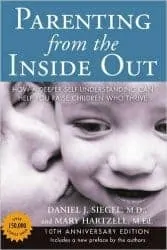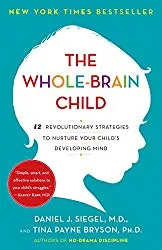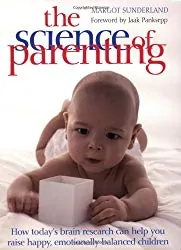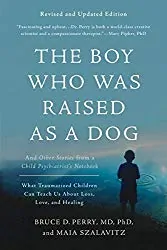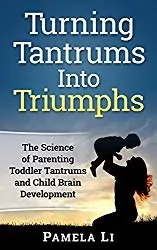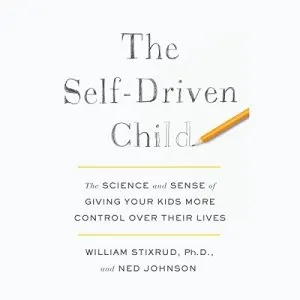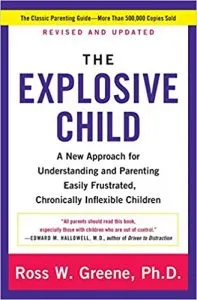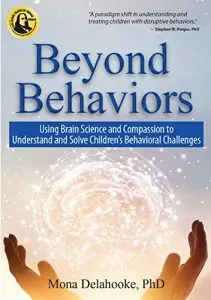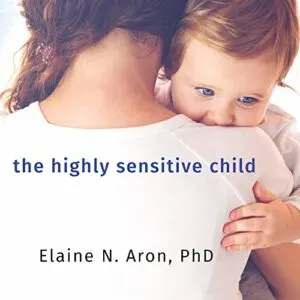Parenting is one of the toughest jobs in the world.
There should be an instruction manual on child care. Many of us moms (and dads) haven’t had any training or classes in raising children. It’s not something we’re very well prepared for.
I am asked all the time for recommendations on the best parenting books.
With the overwhelming amount of books on parenting, advice from friends and families, and blogs on the Internet, it is hard to sift through and find really good ones.
As with everything at Parenting for Brain, we look for the top parenting books that are science-based to help parents be the best parents they want to be. We’re sharing our picks on this year’s top 10 parenting books.

TABLE OF CONTENTS
- Best Parenting Books
- 1. Parenting from the Inside Out
- 2. Positive Discipline A-Z
- 3. The Whole-Brain Child
- 4. The Science of Parenting
- 5. The Boy Who Was Raised as a Dog
- 6. Turning Tantrums Into Triumphs
- 7. The Self-Driven Child
- 8. The Explosive Child
- 9. Beyond Behaviors
- 10. The highly sensitive child: helping our children thrive when the world overwhelms them
Best Parenting Books
Here’s the list of the best books on parenting that are evidence-based.
1. Parenting from the Inside Out
By Daniel J. Siegel and Mary Hartzell
Daniel Siegel, psychiatrist, and professor at UCLA School of Medicine has written several wonderful books on child development and science-based parenting. Parenting from the Inside Out is one of his most well-known works.
This book explains why most parents tend to parent the way they were raised. Our childhood affects how we parent no matter how much we want to deny the links. When nothing seems to work, when your child is not responding to conventional methods, it’s time for parents to look inward.
One thing we can do to become better parents is to examine our childhood and family history to gain better self-understanding. Even those who have had a happy childhood may still have unresolved issues that prevent them from being the best parents they can be.
This book draws on findings in neurological development and Bowlby and Ainsworth’s Attachment Theory research to help parents make sense of their life stories. Age-appropriate strategies are given that not only help parents deal with day-to-day struggles but also demonstrate how “brain integration” can help young children grow and thrive.
This book also rightfully points out the importance of parent-child relationships and how a good relationship can enhance the parenting experience.
2. Positive Discipline A-Z
By Jane Nelsen, Lynn Lott and H. Stephen Glenn
Positive Discipline A-Z is full of clear answers for new parents, from potty training to dealing with power struggles. Its easy-to-read format is convenient for busy or working parents who are constantly on the go.
Positive discipline is an effective method based on mutual respect and positive guidance. It focuses on creating learning opportunities (for the future) instead of punishing mistakes (of the past).
Jane Nelsen wrote a series of authoritative parenting books on this topic; each caters to a slightly different age group or audience but uses a similar approach, e.g., First Three Years, Preschoolers, Teenage years, Teacher’s Guide, Parenting Tools, etc.
My recommendation is to start with this one or the original Positive Discipline and then supplement with the ones for individual age groups if needed.
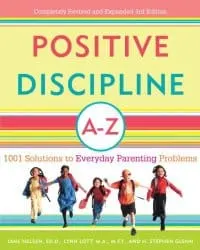
3. The Whole-Brain Child
By Daniel J. Siegel and Tina Payne Bryson
The “Whole Brain Child” approach is about integrating different parts of the brain to help our children live balanced, creative, and meaningful lives. In this book, Daniel Siegel, psychiatrist and professor at UCLA School of Medicine, explains in a creative yet simple way how the different regions in our brains affect our thinking and emotion in our daily lives.
It presents 12 strategies (steps) to integrate our upper brain (decision-making) and lower brain (reactive), as well as our left brain (logical) and right brain (emotional) to improve our emotional intelligence. There are some good real-life examples to help drive home the points.
4. The Science of Parenting
By Margot Sunderland
If you are going to get only one parenting book, this is the one I would recommend you to get. Understanding healthy brain development and physiology is paramount in understanding children’s behavior and what we can do to enhance their growth.
This child development book shows parents how to use science for parenting more effectively. It dispels parenting myths with solid scientific facts. It doesn’t rely on unproven conventional wisdom or “theories” based on any particular “expert.”
When I first read this book, I was very surprised by how many things scientists already knew about child development. And yet, as a mother, I was still given advice and tips based on opinions that only created results parents want without regard to their impacts on our children’s well-being.
This is a must-read for every parent.
5. The Boy Who Was Raised as a Dog
By Bruce D. Perry and Maia Szalavitz
This may seem odd to appear on a parenting book list, but this is one of the best child development books on understanding a child’s brain development and how childhood traumas can be easily caused by parents or even mental health professionals unknowingly.
World-renowned child psychiatrist Dr. Bruce Perry presents a series of heartbreaking stories of children severely damaged in their upbringing and how love and social support helped heal these wounds.
Although the stories are extreme circumstances most of us will not put our children in, they are still very educational as neuro-development (brain development) is explained easily.
Everyone, including parents, educators, and mental health professionals, will learn a thing or two from it.
6. Turning Tantrums Into Triumphs
By Pamela Li
This book became #1 Amazon Best Seller within days of publishing.
Written with busy parents in mind, this book is a short read. It is one of the best-selling toddler parenting books on Amazon.com.
It is packed with scientific information that can help parents calm toddler tantrums fast, especially during the tantrums or meltdowns of the terrible twos.
7. The Self-Driven Child
By William Stixrud and Ned Johnson
The Self-Driven Child by clinical psychologist, William Stixrud, and educator, Ned Johnson, is absolutely the best evidence-based book on child motivation for a good reason.
This book accurately identifies the most common things that cause the lack of motivation in children and the proper solution. It helps parents move from being their child’s manager to being their consultant.
The foundation for the practical advice is a clear understanding of brain structure and development based on neuroscience and psychology. Each chapter ends with a summary and strategies that encourage parents to apply the information practically. Parents are given smart advice on setting up their kids for success in today’s school system.
This is a great read for every parent who wants to raise successful and self-motivated kids.
8. The Explosive Child
By Ross W. Greene
Why are some little kids calm and laid back while others are challenging to calm?
The Explosive Child book defines kids with bad behavior as “inflexible-explosive.” Seemingly explosive kids are stuck with the inflexibility that prevents them from switching their mindset from one setting to the next. These children also have problems self-regulating. As a result, they easily explode when faced with transitions.
This book introduces practical strategies for helping children deal with their low flexibility and a low tolerance for frustration. Many parents with Oppositional Defiance Disorder kids find it a useful resource.
One point I disagree with is that the author believes these strategies are ways to keep inflexible-explosive kids at bay to create peace at home. But I believe the strategies apply to every child because they are (should be) based on respect for kids, not just those who are bold enough to tell us they can’t tolerate over-restrictive control from parents.
9. Beyond Behaviors
By Mona Delahooke
This is another great book that helps parents of ODD and ADHD kids.
Delahooke integrates Stephen Porges’ Polyvagal Theory with information on sensory systems and neuroscience to help parents deal with challenging behavior. Behaviorally challenged kids generally have an overactive fight-or-flight response to daily stressors. Their high-strung nervous system keeps their brains from developing on par with their peers and causes misbehavior.
The new approach reframes challenging kids’ “problems” and helps teachers and parents shift the paradigm away from reward and punishment to empathy and compassion. It’s a refreshingly compassionate and brain-based idea.
Beyond Behaviors lays out the importance of building an environment of safety, respecting individual diversity, and understanding children’s sensory and nervous systems. It also provides a roadmap for adults to learn coping skills and regulate their own emotions. Only when parents can provide an emotionally healthy, loving, and kind environment will they know how to help a child regulate their emotions.
10. The highly sensitive child: helping our children thrive when the world overwhelms them
By Elaine Aron
Dr. Aron, a highly sensitive person herself, provides insights into the minds and hearts of those with sensory processing sensitivity. She explains how to understand the challenges of being a highly sensitive person.
This book provides strategies and practical tips that guide parents through the challenges of raising highly-sensitive kids. Highly sensitive parents can also learn practical steps to take care of themselves while helping their children thrive.

